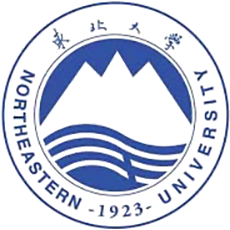 201-300
201-300 


About Northeastern University Located in Shenyang, the economic capital of Northeastern China, Northeastern University (NEU) is a national key university directly affiliated with the Ministry of Education, P. R. China. The campus occupies an area of 2,605,986 square meters and an architectural area of 1,566,700 square meters. NEU was founded in April 1923 with a long history of patriotism. The renowned patriot, General Peter. H. L. Chang, served as the president of NEU from August 1928 to January 1937. After the “September 18th Incident”, NEU was moved to Beijing, Kaifeng, Xi’an and Santai County in Sichuan Province. During this period, the teachers and students proactively participated in the patriotic anti-Japanese movements and became the main power and pioneers in the “December 9th Students Movement”. In March 1949, Shenyang Institute of Engineering was restructured and turned into the School of Engineering and the School of Science of NEU. In August 1950, Northeastern Institute of Engineering was established based on the combination of Shenyang Institute of Engineering, Fushun Mining College and Anshan Engineering College. In 1960, it was rated as one of the 64 key national universities. NEU was one of the first universities which could confer bachelor’s degrees, master’s degrees and Ph.D. degrees accredited by the State Council. On March 8, 1993, Northeastern Institute of Engineering was renamed Northeastern University. In September 1998, Northeastern University became directly affiliated with the Ministry of Education instead of the Ministry of Metallurgical Industry, China. NEU is among the first batch of universities of “the Project 211” and “the Project 985” of China and jointly built by the Ministry of Education, provincial and municipal governments. NEU is composed of Graduate School, Qin Huangdao Branch, Fundamental School, School of Humanities and Laws, School of Marxism, School of Foreign Studies, School of Fine Arts, School of Business Administration, School of Science, School of Resources and Civil Engineering, School of Materials and Metallurgy, School of Mechanical Engineering and Automation, School of information Science and Engineering, School of Software Engineering, Sino-Dutch Biomedical Information and Engineering School, School of National Defense Education, School of Life and Health Sciences, JangHo School of Architecture, Department of Physical Education and School of Continuing Education. So far there are 66 undergraduate programs, 17 postdoctoral research stations, 21 doctoral programs of first-level disciplines and 37 master programs of first-level disciplines. There are 3 national first-level disciplines, 4 national second-level disciplines and 1 national key discipline (cultivation).Additionally, NEU has been equipped with 3 national key laboratories and 4 national engineering (technology) research centers. Having fully taken advantages of its technique and talents and firmly supporting its target of serving society by incubating hi-tech industries, NEU has explored an effective way of developing hi-tech industry by combining industry, education and research together. NEU Scientific Park was the first of its kind in China and it became one of the first 15 pilot university scientific parks in China in 2000. Insisting on the policy of embracing the world and openness, NEU has established long-term and stable cooperative relationships with 195 institutions from 34 countries and regions. Leaders of China and Communist Party of China have attached great importance to NEU’s construction and development, among whom Hu Jintao, Jiang Zemin, Wu Bangguo, Wen Jiabao, Jia Qinglin, Li Changchun, Li Peng, Zhu Rongji, Li Lanqing, Zeng Qinghong and Wu Guanzheng visited NEU. Looking into the future, NEU will seize all opportunities to cultivate and maintain its distinctiveness, striving to build itself as a domestically top-ranking and internationally famous high-level research university leading the process of modern industrialization of China.
 201-300
201-300 
| Subject | Rank |
|---|---|
Mining & Mineral Engineering | 3 |
Metallurgical Engineering | 5 |
Automation & Control | 7 |
Instruments Science & Technology | 11 |
Computer Science & Engineering | 51-75 |
Civil Engineering | 76-100 |
Chemical Engineering | 76-100 |
Transportation Science & Technology | 76-100 |